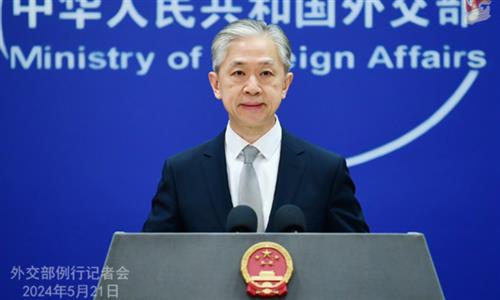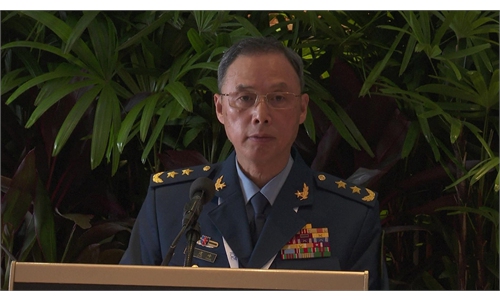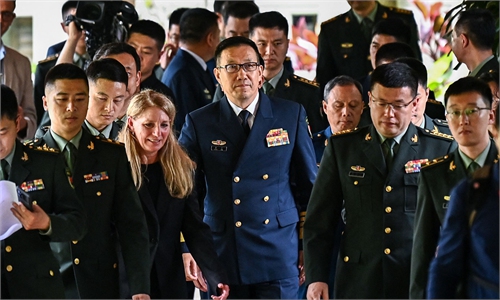China issues judicial guidelines on criminal punishment on diehard ‘Taiwan independence’ forces
Judicial measures taken by mainland to hold separatists accountable: analysts

On May 7, 2024, multiple political and civilian groups in the Taiwan island start an activity to urge the Democratic Progressive Party (DPP) authorities to adhere to the one-China principle. Photo: Courtesy to Wang Wu-lang
Chinese authorities on Friday issued a set of guidelines on imposing criminal punishments on diehard "Taiwan independence" separatists for conducting or inciting secession, which allows death penalty and a trial in absentia in relevant cases and stipulates that those who are found to have colluded with any foreign or overseas institution, organization or individual in committing such crimes should be given a harsher punishment.Analysts said that employing judicial measures to punish the diehard "Taiwan independence" separatists represents a significant response by the mainland to the escalating challenges posed by "Taiwan independence." Those persisting in advocating "Taiwan independence" will face harsher consequences as a result.
The guidelines, jointly issued by the Supreme People's Court, the Supreme People's Procuratorate, and the ministries of public security, state security, and justice on Friday, will take effect upon release.
The document, based on the Anti-Secession Law, the Criminal Law and the Criminal Procedure Law, contains 22 articles and provides more specific rules concerning conviction and sentencing in the crimes of splitting or inciting separatism, as well as relevant procedures, serving as a guidance for the judiciary in handling relevant cases.
It spells out clearly defined circumstances in which a very few diehard "Taiwan independence" separatists, through acts such as organizing, plotting or carrying out schemes of "de jure independence," or seeking independence by relying on foreign support or by force, should be held criminally responsible.
The guidelines hold significant political and legal importance. The use of judicial means to punish the stubborn "Taiwan independence" separatists this time is not only a major countermeasure adopted by the mainland in response to increasingly severe "Taiwan independence" challenges but also a choice that was made out of necessity, Wang Yingjin, director of the Center for Cross-Straits Relations Studies at Renmin University of China, told the Global Times.
This is another major move following the issuance of lists to punish stubborn "Taiwan independence" separatists in 2021 and 2022 respectively, which not only demonstrates the mainland's firm determination and will to oppose "Taiwan independence" separatist activities, but also enhances the operational feasibility of holding stubborn "Taiwan independence" forces criminally accountable, said Wang.
The guidelines issued on Friday detail the specific circumstances under which the crimes of separatism and incitement to separatism apply to stubborn "Taiwan independence" separatists, Ma Yan, a member of the Adjudication Committee of the Supreme People's Court, said at a press conference on Friday.
It provides regulations concerning the identification of "principal perpetrators," "serious offenses," and "active participation," offering clear guidance for judicial handling of relevant cases.
Addressing collusion between "Taiwan independence" diehard separatists and foreign forces plotting separatist actions, the guidelines stipulate that under the Criminal Law, severe penalties shall be imposed, said Ma.
Moreover, the guidelines stipulate that for stubborn "Taiwan independence" separatists who voluntarily abandon their stance on "Taiwan independence," cease engaging in separatist activities, and take measures to mitigate or eliminate harmful consequences or prevent their expansion, it provides an opportunity for reform.
Wang noted that this demonstrates that the Chinese mainland's implementation of penalties against stubborn "Taiwan independence" separatists is not only about punishment but also about education, transformation, and redemption.
The guidelines issued on Friday are part of a series of measures taken by the Chinese mainland to counter "Taiwan independence" separatists through legal means and also showed that as the situation in the Taiwan Straits develops, the process of national reunification is continuously progressing, Zheng Jian, professor from the Center for Taiwan Studies of Xiamen University, told the Global Times.
The issuing of the guidelines, which comes after Taiwan regional leader Lai Ching-te has been in office since May 20, is also a warning to separatists on the island, as Lai's speech on May 20 and his later remarks indicated his persistence in seeking "Taiwan independence," said Zheng, noting that for separatists who persist in their obstinacy, what awaits them will be severe legal punishment.





